6650 Frankford Ave
Philadelphia, PA 19135
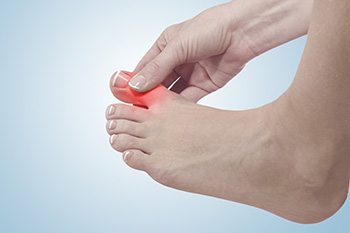
Gout is an arthritic condition that is caused by excess uric acid in the blood stream and a buildup and crystallization of these compounds in the body. This can happen from eating or drinking foods or beverages with purines, such as beer, red meat, and certain types of seafood. Symptoms of gout include redness, joint tenderness, and severe pain. It often affects the joint in the big toe first, and may radiate to the other toes. Gout is perceived as a condition that afflicts older men. Getting gout increases with age, and women are more apt to develop gout after menopause. Gout can result in frequent or infrequent attacks. If you think you may have gout, please see a podiatrist for diagnosis and treatment as soon as possible.
Gout is a foot condition that requires certain treatment and care. If you are seeking treatment, contact John M. Fanelly, DPM from Northeast Philadelphia. Our doctor will treat your foot and ankle needs.
What Is Gout?
Gout is a type of arthritis caused by a buildup of uric acid in the bloodstream. It often develops in the foot, especially the big toe area, although it can manifest in other parts of the body as well. Gout can make walking and standing very painful and is especially common in diabetics and the obese.
People typically get gout because of a poor diet. Genetic predisposition is also a factor. The children of parents who have had gout frequently have a chance of developing it themselves.
Gout can easily be identified by redness and inflammation of the big toe and the surrounding areas of the foot. Other symptoms include extreme fatigue, joint pain, and running high fevers. Sometimes corticosteroid drugs can be prescribed to treat gout, but the best way to combat this disease is to get more exercise and eat a better diet.
If you have any questions please feel free to contact our office located in Philadelphia, PA . We offer the newest diagnostic and treatment technologies for all your foot and ankle needs.
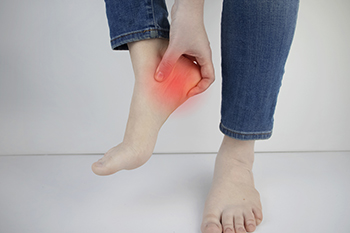
Plantar Fasciitis occurs when the plantar fascia ligament, running from the heel to the toes and supporting the arch of the foot, sustains strain or tears. This condition can cause severe pain in the heel of the foot making walking and standing uncomfortable. One way to manage plantar fasciitis is taping. Plantar fasciitis tape is sometimes called low-Dye tape and using the tape for this affliction involves taping the foot and ankle to help stabilize the plantar fascia and provide arch support. This can help reduce the amount of stretching and movement of the ligament when one is on their feet and gives the plantar fascia a chance to heal. It provides short-term relief for those with plantar fasciitis and is something that can be discussed and done by a qualified podiatrist. Such a medical professional can also provide further treatment and suggestions for plantar fasciitis.
Plantar fasciitis can be very painful and inconvenient. If you are experiencing heel pain or symptoms of plantar fasciitis, contact John M. Fanelly, DPM from Northeast Philadelphia. Our doctor can provide the care you need to keep you pain-free and on your feet.
What Is Plantar Fasciitis?
Plantar fasciitis is the inflammation of the thick band of tissue that runs along the bottom of your foot, known as the plantar fascia, and causes mild to severe heel pain.
What Causes Plantar Fasciitis?
How Can It Be Treated?
While very treatable, plantar fasciitis is definitely not something that should be ignored. Especially in severe cases, speaking to your doctor right away is highly recommended to avoid complications and severe heel pain. Your podiatrist can work with you to provide the appropriate treatment options tailored to your condition.
If you have any questions please feel free to contact our office located in Philadelphia, PA . We offer the newest diagnostic and treatment technologies for all your foot and ankle needs.
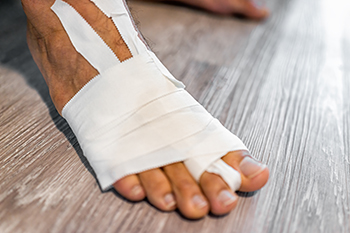
Anyone who participates in sports or running activities knows that sooner or later they are liable to sustain some type of foot, toe, or ankle injury. Precautions that can help you to avoid such injuries are warming up before exercising and resisting the urge to do more than your body is prepared for. Additionally, it can help to increase exercise levels slowly. Most sports injuries are caused by doing too much too soon, overestimating your stamina and strength, and poor technique. Other causes include overtraining by pushing your body too hard, accidents, and using poor equipment. This last cause includes wearing shoes that do not fit properly, are wrong for the activity, or fail to provide proper support and cushioning needed for that sport. It is also important to pay attention to any pain you may incur during sports activities. Ignoring it can make a mild injury or condition much worse. Furthermore, continuing play or exercise despite the pain can increase the time it takes to recover. Seeking medical advice from a podiatrist when you experience foot, toe or ankle pain is a wise course of action. A podiatrist can make a thorough examination, determine the cause of the pain, and provide appropriate treatment options.
Sports related foot and ankle injuries require proper treatment before players can go back to their regular routines. For more information, contact John M. Fanelly, DPM of Northeast Philadelphia. Our doctor can provide the care you need to keep you pain-free and on your feet.
Sports Related Foot and Ankle Injuries
Foot and ankle injuries are a common occurrence when it comes to athletes of any sport. While many athletes dismiss the initial aches and pains, the truth is that ignoring potential foot and ankle injuries can lead to serious problems. As athletes continue to place pressure and strain the area further, a mild injury can turn into something as serious as a rupture and may lead to a permanent disability. There are many factors that contribute to sports related foot and ankle injuries, which include failure to warm up properly, not providing support or wearing bad footwear. Common injuries and conditions athletes face, including:
Sports related injuries are commonly treated using the RICE method. This includes rest, applying ice to the injured area, compression and elevating the ankle. More serious sprains and injuries may require surgery, which could include arthroscopic and reconstructive surgery. Rehabilitation and therapy may also be required in order to get any recovering athlete to become fully functional again. Any unusual aches and pains an athlete sustains must be evaluated by a licensed, reputable medical professional.
If you have any questions please feel free to contact our office located in Philadelphia, PA . We offer the newest diagnostic and treatment technologies for all your foot and ankle needs.
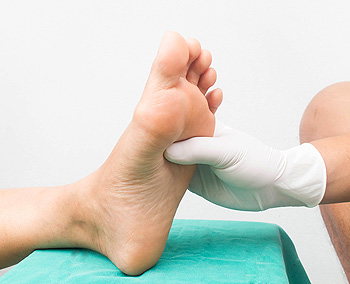
Most people who have diabetes are aware of the importance of taking proper care of their feet. This often begins with checking the bottom of the feet for existing cuts and scrapes and can be done by using a mirror. A caregiver or family member may be able to help with this task if the patient is unable to perform this. Many diabetic patients develop neuropathy, which is the inability to feel sensations on the feet. This can happen from nerve damage, which may occur from having elevated blood glucose levels. An additional complication of diabetes is poor circulation, which may increase the risk of developing a foot ulcer. Effective management advice for diabetic patients consists of refraining from walking barefoot, trimming the toenails correctly, and implementing a gentle exercise and stretching regime. If you have diabetes, it is strongly urged that you are under the care of a podiatrist who can monitor and help you to manage this condition.
Diabetic foot care is important in preventing foot ailments such as ulcers. If you are suffering from diabetes or have any other concerns about your feet, contact John M. Fanelly, DPM from Northeast Philadelphia. Our doctor can provide the care you need to keep you pain-free and on your feet.
Diabetic Foot Care
Diabetes affects millions of people every year. The condition can damage blood vessels in many parts of the body, especially the feet. Because of this, taking care of your feet is essential if you have diabetes, and having a podiatrist help monitor your foot health is highly recommended.
The Importance of Caring for Your Feet
Patients with diabetes should have their doctor monitor their blood levels, as blood sugar levels play such a huge role in diabetic care. Monitoring these levels on a regular basis is highly advised.
It is always best to inform your healthcare professional of any concerns you may have regarding your feet, especially for diabetic patients. Early treatment and routine foot examinations are keys to maintaining proper health, especially because severe complications can arise if proper treatment is not applied.
If you have any questions please feel free to contact our office located in Philadelphia, PA . We offer the newest diagnostic and treatment technologies for all your foot and ankle needs.
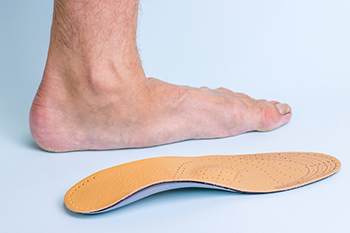
Flat feet are a condition of the feet and its name is quite literal. Those with flat feet have a foot shape that causes the entire sole of the foot to rest flush against the floor. This condition is, for many different patients, mostly benign. However, it may be a source of pain for many other patients. There are several different exercises that you might be able to perform to mitigate the condition of flat feet. By performing certain foot exercises, it is possible to correct sunken arches. First, someone could consider performing heel stretches. This exercise consists of standing in a lunge-like position and slowly leaning or bending into the stretch several times on each side. A person might even consider rolling a golf ball or tennis ball underneath their feet while in a seated position. Contact a podiatrist today for more information about how performing certain exercises might help you correct flat feet.
Flatfoot is a condition many people suffer from. If you have flat feet, contact John M. Fanelly, DPM from Northeast Philadelphia. Our doctor will treat your foot and ankle needs.
What Are Flat Feet?
Flatfoot is a condition in which the arch of the foot is depressed and the sole of the foot is almost completely in contact with the ground. About 20-30% of the population generally has flat feet because their arches never formed during growth.
Conditions & Problems:
Having flat feet makes it difficult to run or walk because of the stress placed on the ankles.
Alignment – The general alignment of your legs can be disrupted, because the ankles move inward which can cause major discomfort.
Knees – If you have complications with your knees, flat feet can be a contributor to arthritis in that area.
Symptoms
Treatment
If you are experiencing pain and stress on the foot you may weaken the posterior tibial tendon, which runs around the inside of the ankle.
If you have any questions please feel free to contact our office located in Philadelphia, PA . We offer the newest diagnostic and treatment technologies for all your foot and ankle needs.